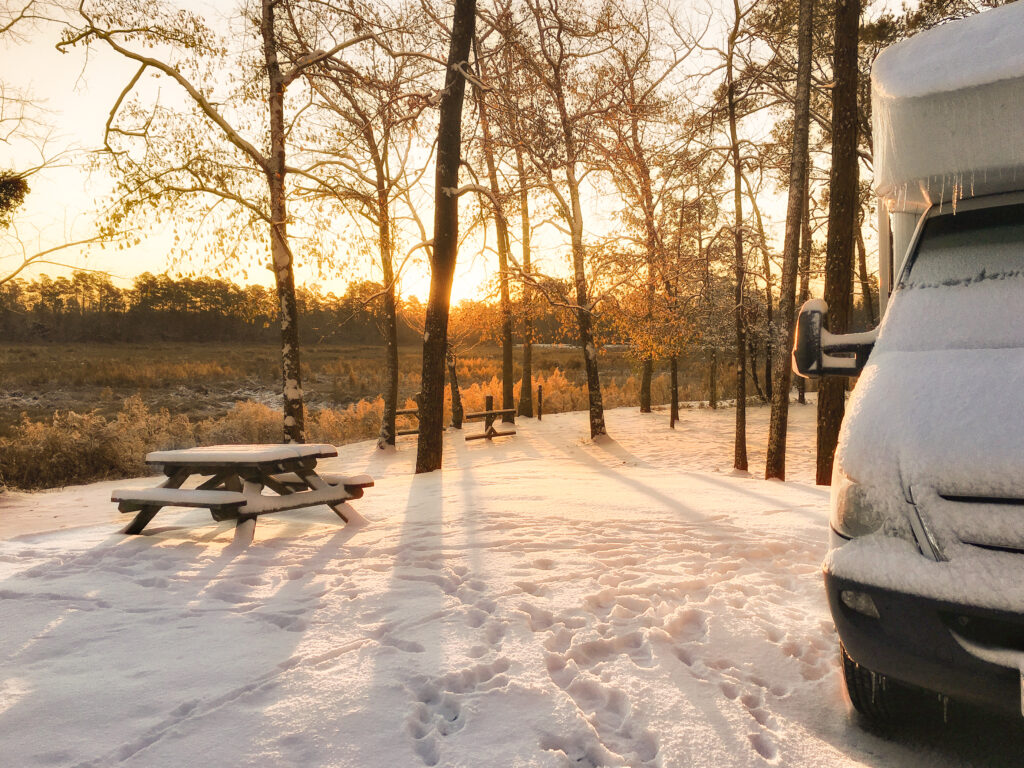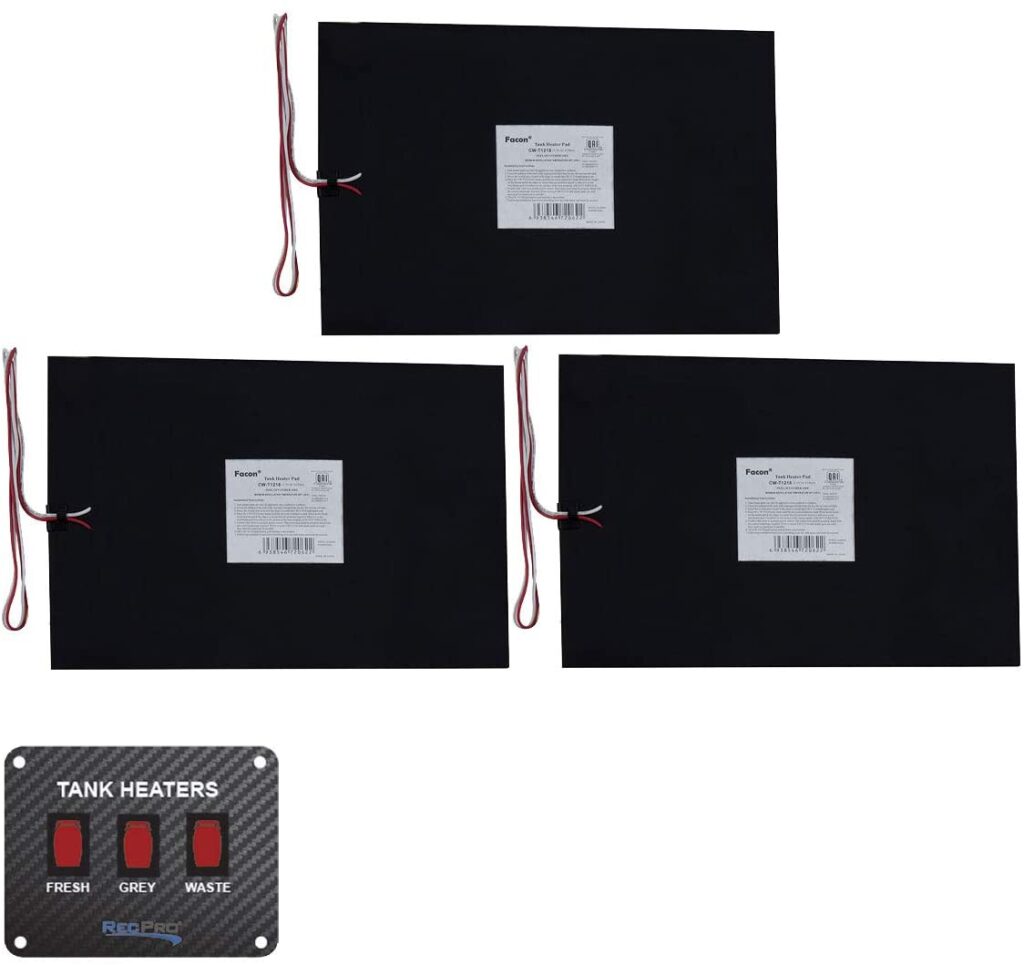
- Keep your tanks from freezing this winter with an RV tank heater. Photo via Shutterstock Standard License
Can You Winter Camp Without RV Tank Heaters?
RV tank heaters are a useful RV gadget that can really improve your winter camping experience. Some rigs come with these handy heaters already installed, but many RV owners choose to install RV tank heaters themselves.
Many RVers don’t have tank heaters at all. They get along just fine without them. This leaves some RV owners wondering if RV tank heaters are really necessary.
The answer? They are extremely helpful for some types of RVers in certain cases, but are not necessary per se, as there are other ways to get the job done.
Want to know more about RV tank heaters? We’re going to talk about what they are, who should think about installing them, and other useful winter camping tips.
What are RV tank heaters?
The first thing to clarify is what exactly RV tank heaters are. They are just what you might think: heaters designed to keep the holding tanks warm.

- RV tank heaters. Photo via Amazon
These tank heaters come in the form of electric heating pads glued to the bottoms of the tanks and wired into the RV electric system. A switch is installed on or near the control panel to turn the heaters on and off, so you can pick and choose when they are in use.
The RV tank heaters should always be switched on if the outside temperature will dip below freezing, as they will keep the water in your tanks from freezing, preventing cracking and other issues. The residual heat from these pads could also help keep surrounding pipes warm, helping prevent burst pipes.
Who should use RV tank heaters?
As mentioned above, heaters are most helpful to a particular set of RVers. If you are camping in freezing temperatures, especially if you do so on a regular basis, then yes, you are a part of this group, and you should probably consider investing in RV tank heaters. Fortunately, this is a relatively inexpensive upgrade that most handy people should be able to take care of on their own.
Those who camp only in summer, or even those who do some fall and spring camping but never in below freezing temps, likely won’t find themselves needing tank heaters. Likewise, snowbirds who head south for the winter probably won’t need tank heaters, as they make a point of staying in warm weather even when winter rolls around.
Other ways to keep RV tanks from freezing
If you do camp in below-freezing temperatures but don’t have the handy skills needed to install RV tank heaters, you might be looking for other ways to ensure your RV tanks stay thawed this winter. Lucky for you, there are ways to go about this.
Create RV skirting
The first option is to create or buy some type of RV skirting. If your RV is stationary, you can build an insulated skirt around the rig using Styrofoam or wood. The problem is, those who move often can’t very well pack up and unload such solid skirting every time they move. For these individuals, we recommend some sort of skirting such as the product made by this company.
Add antifreeze
Another option is to add RV antifreeze to your holding tanks to keep liquids from freezing up inside. This option is by far the easiest, but it’s important to keep in mind that while skirting and heaters will help keep pipes from freezing, this option does nothing for the pipes.
Additionally, antifreeze cannot be added to the freshwater tank if you intend to use it, meaning you will have to stick with the city water connection, something that presents its own set of problems.
Other winter camping tips
Before we finish this article out, we’d like to leave you with a couple more winter camping water tips. These should help you keep everything flowing nicely even when the weather is freezing.
Use heated hoses
As we mentioned, if you use the antifreeze method above, you will need to use the city water connection rather than the freshwater holding tank. Of course, some people prefer the city water connection anyway. In any case, if you will be connected to city water during freezing weather, you will want to invest in a heated hose. This will prevent freezing between the water spigot and your RV.
Additionally, it’s a good idea to use some heat tape on your sewer hose to ensure nothing freezes up during dumping.
Dump tanks wisely
Speaking of dumping, it’s important that you are strategic about the way you dump your tanks when the weather is super cold.
Even if you have tank heaters installed, liquids can still freeze in the pipes and sewer hose leading to the sewer. You will want to leave the dump valves closed on both waste tanks until you’re ready to dump, and then close them again right away and lift the sewer hose to ensure it is completely empty.
As you can see, tank heaters are nice to have if you camp in freezing cold weather. However, there are other ways to ensure your tanks stay warm, so if you can’t afford RV tank heaters or aren’t sure how to install them, waiting to make that upgrade isn’t going to hurt anything as long as you find other ways to prevent frozen plumbing during your camping adventures.
Read more about winter camping:
- 10 Winter Camping Items You Shouldn’t Travel Without
- How To Avoid Winter Camping Problems In Your RV
- How To Keep Your RV Plumbing From Freezing When Winter Camping

This isn’t a simple topic. You need to mention that some RVs have enclosed basements. Freezing weather is mite complicated than you make out.
I think you missed the whole point of 12v tank heaters. Most modern propane RV furnaces put some of their heat output into the floor cavity where the tanks are mounted to keep them from freezing in cold temperatures. However, when you are on the highway with cold wind and temperatures trying to freeze your tanks, you can’t leave your propane furnace on to keep tanks from freezing. That is where the 12v heating pads shine! Turn them on when you are traveling on the highway and you’ll save a ton of trouble with frozen tanks. Traveling when its below freezing is when you really must have them. Put a squirt of RV antifreeze in the gray and black tanks, and turn on the 12v heater on the fresh tank to keep your systems running smoothly!
Are you kidding? First of ALL, if a NEW RV comes with an RV heater option consider it. The Old Rule of thumb applies here. It is better to have something, and not need it, rather than Not having something and needing it. For proof I offer TEXAS. No one in that State thought gee, we need to put water lines 3 feet below the surface, in case it freezes. And look what happened. Secondly, I don’t know where you get your Misinformation from? Some RV sales pitch? Or other Bad source. But, NO! If you empty the Fresh Water tank, and place RV antifreeze in it. Then run the pump and open each hot and cold fixture valve (after placing bypass [connect input/output lines together] on Hot Water tank, draining tank, and adding RV antifreeze to Hot Water Tank), until pink antifreeze comes out of the fixture, you won’t have frozen pipes. I live in OHIO, and we just had 3 weeks of 20 degree weather. I am confindent that like every year prior. Nothing froze after proper winterizing. Third, skirting is only as good as the insulation behind it. If you place skirting on your RV to keep the wind/snow out. It will NOT keep the cold out. Only insulation can do that.
Pretty sure the heat tape you linked to is unsuitable for RV hose use.
Heat goes to cold. Insulation just slows that process. Insulation does not keep cold out. It may help in keeping wind out.
Great article on tank heaters! Thank you!
In doing a lot of reading about RV anti freeze this is the most common comment:Image result for dilute rv antifreeze
Why You Shouldn’t Dilute RV Antifreeze
Even though you add water to the concentrate you should never add more than the instructions say to add because it will start to lose it’s antifreeze abilities and you may end up with broken pipes once winter is over.
Putting it in the holding tanks will dilute it so it is just a waste.
If would be interesting if someone researched to actual freeze temperature of the grey tank and the black tank with their significant addition of compounds that lower the freeze point of the liquid. Certainly it is well below 32 F
It depends. What type of camper, how is it equipped, will you be using it in winter, will you be camping in Florida, or Alaska (southern, or northern). Holding tank? No thanks, DIY composting toilet. Fresh water tank? No thanks, water jugs stored inside. And so on. I prefer keeping things simple, and not likely to quit on you. If I do it myself, I can fix it myself. K.I.S.S.
adding cheap vodka is a better solution to RV antifreeze, as it taste terrible.
I’m a former RV engineer. Tank heaters commonly sold are poor products. While they will heat your tanks, they are wasteful and poorly controlled. They turn on at 45F and turn off at 68F. Their inefficient temperature control is because they put a thermostat INSIDE the heater itself where it can only sense the temperature of the heater, not the environment. They NEED a separate thermostat. In effect, they turn on prematurely and don’t turn off they reach a ridiculous temperature. It might as well not have a thermostat. If YOU do not effectively become the thermostat they lack, you will waste a lot of power. It essentially guarantees that once they turn on, they will practically never turn off. If has been this way for a long time and makes no sense that the RV community should tolerate it. I assume it is simply because they are unaware.